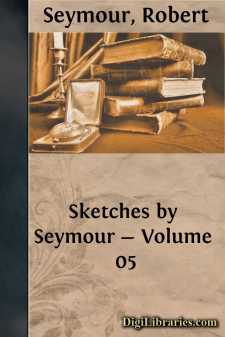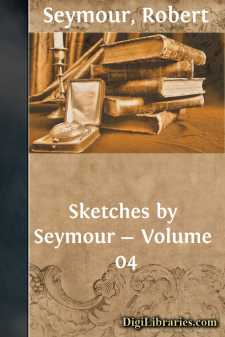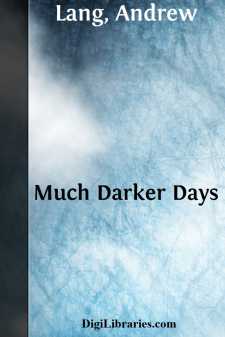Humor
- General
General Books
Sort by:
by:
Robert Seymour
SCENE I. "Walked twenty miles over night: up before peep o' day again got a capital place; fell fast asleep; tide rose up to my knees; my hat was changed, my pockets picked, and a fish ran away with my hook; dreamt of being on a Polar expedition and having my toes frozen." O! IZAAK WALTON!—Izaak Walton!—you have truly got me into a precious line, and I certainly deserve the rod for...
more...
by:
Robert Seymour
SCENE I. "Walked twenty miles over night: up before peep o' day again got a capital place; fell fast asleep; tide rose up to my knees; my hat was changed, my pockets picked, and a fish ran away with my hook; dreamt of being on a Polar expedition and having my toes frozen." O! IZAAK WALTON!—Izaak Walton!—you have truly got me into a precious line, and I certainly deserve the rod for...
more...
by:
Selwyn Brinton
INTRODUCTORY The word Caricature does not lend itself easily to precise definition. Etymologically it connects itself with the Italian caricare, to load or charge, thus corresponding precisely in derivation with its French equivalent Charge; and—save a yet earlier reference in Sir Thomas Browne—it first appears, as far as I am aware, in that phrase of No. 537 of the Spectator, "Those burlesque...
more...
by:
Oliver Herford
William Dean HowellsNot squirrels in the park aloneHis love and winter-kindness own.When Literary Fledglings tryTheir wings, in first attempt to fly,They flutter down to Franklin Square,Where Howells in his "Easy Chair"Like good Saint Francis scatters crumbsOf Hope, to each small bird that comes.And since Bread, cast upon the main,Must to the giver come again,I tender now, long overtime,This...
more...
by:
Robert Seymour
THERE is certainly no style of writing requiring so much modest assurance as autobiography; a position which, I am confident, neither Lord Cherbury, nor Vidocq, or any other mortal blessed with an equal developement of the organ of self-esteem, can or could deny. HOME, ("sweet home,")—in his Douglas—gives, perhaps, one of the most concise and concentrated specimens extant, of this species...
more...
by:
Robert Seymour
On a grassy bank, beside a meandering stream, sat two gentlemen averaging forty years of age. The day was sultry, and, weary of casting their lines without effect, they had stuck their rods in the bank, and sought, in a well-filled basket of provisions and copious libations of bottled porter, to dissipate their disappointment. "Ain't this jolly? and don't you like a day's fishing,...
more...
by:
Robert Seymour
WATTY WILLIAMS was a studious youth, with a long nose and a short pair of trowsers; his delight was in the green fields, for he was one of those philosophers who can find sermons in stones, and good in everything. One day, while wandering in a meadow, lost in the perusal of Zimmerman on Solitude, he was suddenly aroused from his reverie by a loud "Moo!" and, turning about, he descried, to his...
more...
by:
Andrew Lang
CHAPTER I.—The Curse (Registered). WHEN this story of my life, or of such parts of it as are not deemed wholly unfit for publication, is read (and, no doubt, a public which devoured 'Scrawled Black' will stand almost anything), it will be found that I have sometimes acted without prim cautiousness—that I have, in fact, wallowed in crime. Stillicide and Mayhem I (rare old crimes!) are...
more...
by:
Stephen Leacock
I. The Balance of Trade in Impressions FOR some years past a rising tide of lecturers and literary men from England has washed upon the shores of our North American continent. The purpose of each one of them is to make a new discovery of America. They come over to us travelling in great simplicity, and they return in the ducal suite of the Aquitania. They carry away with them their impressions of...
more...
by:
James Parton
PREFACE. The design of the projector of this volume was, that it should contain the Best of the shorter humorous poems in the literatures of England and the United States, except: Poems so local or cotemporary in subject or allusion, as not to be readily understood by the modern American reader; Poems which, from the freedom of expression allowed in the healthy ages, can not now be read aloud in a...
more...











